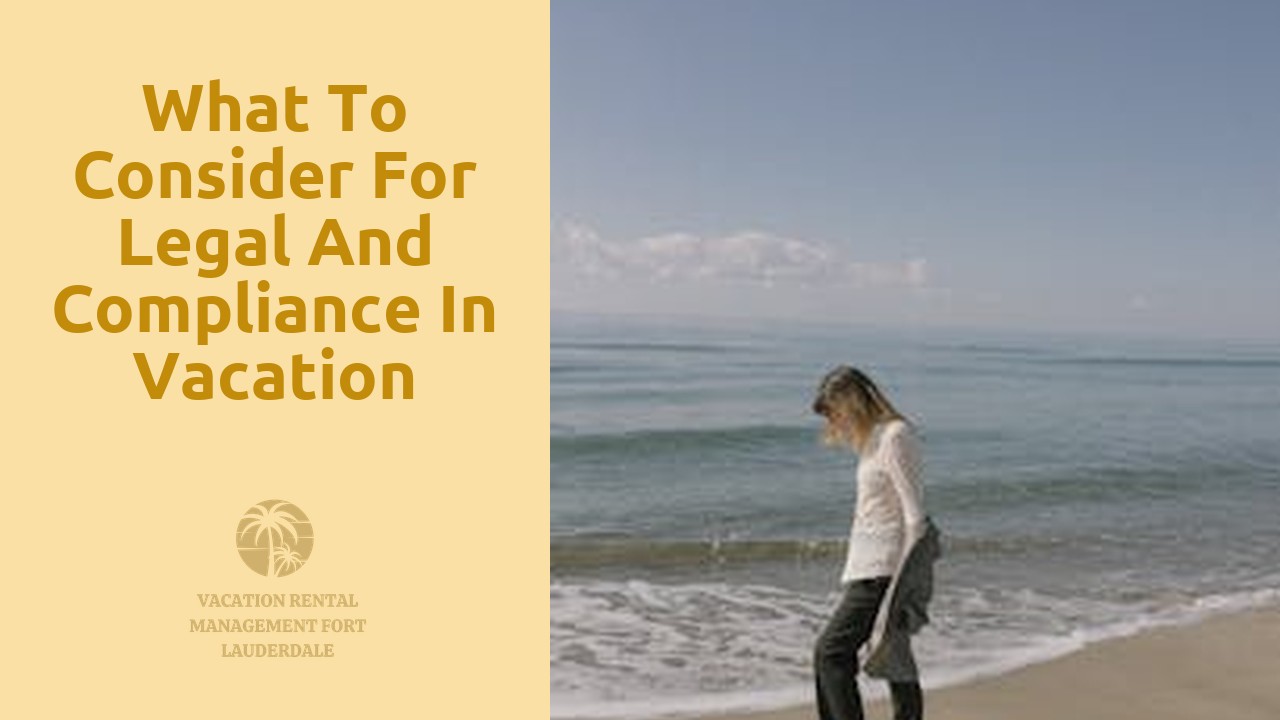
What to Consider for Legal and Compliance in Vacation Rental Management
Table Of Contents
Guest Screening
Guest screening is a crucial aspect of managing vacation rentals to ensure the safety and security of your property. Implementing a thorough screening process is essential in order to filter out potential guests who may cause damage or disturbances during their stay. By conducting background checks, reviewing rental history, and verifying identities, you can minimize the risk of incidents and maintain a peaceful rental environment.
It is important to establish clear screening criteria and guidelines to streamline the process and make informed decisions when approving or denying potential guests. Communicate your screening policies clearly on your rental platform and require all guests to adhere to the same standards. This transparency helps set expectations for both hosts and guests, leading to more successful and enjoyable rental experiences for all parties involved.
Implement a Screening Process
When managing vacation rentals, implementing a thorough screening process for potential guests is crucial to ensure the safety and security of your property. By establishing a screening process, you can vet guests effectively and minimize the risk of troublesome renters. Start by gathering essential information from guests, such as their full names, contact details, and purpose of their trip. This initial screening step can help you filter out any red flags and determine if the guest is a suitable fit for your property.
Utilize background checks and verification services to delve deeper into a guest's background and confirm their identity. Look for any previous rental-related issues, criminal records, or negative reviews from other hosts. Additionally, consider requesting references from previous hosts or employers to gain further insights into the guest's character and behavior. By thoroughly vetting potential guests through a comprehensive screening process, you can maintain a secure and pleasant environment for both your property and future guests.
Security Deposits
Security deposits play a crucial role in vacation rental management, serving as a form of protection for property owners against potential damages or issues caused by guests during their stay. By implementing clear deposit policies, property owners can establish guidelines for guests regarding the conditions under which a security deposit may be withheld. These policies should outline specific instances where deductions may occur, such as damage to property or violations of rental agreements.
When setting security deposit amounts, property owners should consider factors such as property size, amenities, and potential risks associated with renting out the space. By establishing an appropriate deposit amount, owners can strike a balance between protecting their property and offering reasonable terms for guests. Additionally, communicating deposit policies clearly and transparently to guests prior to booking can help prevent misunderstandings or disputes down the line, ultimately contributing to a smoother rental experience for both parties.
Establish Clear Deposit Policies
It is crucial for vacation rental management companies to establish clear deposit policies to protect both hosts and guests. Clear communication regarding deposit amounts, deadlines, refund processes, and any conditions for forfeiture is essential to avoid disputes or misunderstandings. By outlining these policies upfront and providing detailed information to guests, managers can ensure a smooth and transparent booking experience for all parties involved.
Additionally, having well-defined deposit policies helps to improve trust and credibility with guests. When guests understand the deposit requirements and procedures, they are more likely to feel confident in their booking decision and reassured that their funds are being handled professionally. This sense of security can lead to positive reviews, repeat bookings, and ultimately, a stronger reputation for the vacation rental management company.
Compliance with ADA
When it comes to vacation rental management, ensuring compliance with the Americans with Disabilities Act (ADA) is crucial. Property owners must make certain that their rental accommodations are accessible to guests with disabilities. This includes providing features such as wheelchair ramps, handrails, and accommodations for individuals with hearing or vision impairments. By adhering to the ADA guidelines, property owners can ensure that all guests have a comfortable and inclusive stay.
In addition to physical accommodations, property owners should also consider the overall experience for guests with disabilities. This includes providing clear communication regarding accessibility features, ensuring that all online booking platforms are user-friendly for individuals with disabilities, and offering alternative forms of communication for guests who may have difficulty using traditional methods. By taking proactive steps to comply with ADA regulations, property owners can create a welcoming environment for all guests, regardless of their individual needs or abilities.
Ensure Accessibility for Guests with Disabilities
Guests with disabilities should be able to enjoy vacation rentals just like any other guest. Ensuring accessibility is not only a legal requirement but also a moral obligation for vacation rental managers. By providing accommodations that cater to individuals with disabilities, you are not only expanding your potential market but also creating a more inclusive and welcoming environment for all guests.
Some simple steps to ensure accessibility for guests with disabilities include providing wheelchair ramps, accessible parking spaces, grab bars in bathrooms, and wider doorways. It is important to communicate with guests prior to their arrival to understand their specific needs and make necessary arrangements to accommodate them. By proactively addressing accessibility concerns, you can demonstrate your commitment to providing a safe and comfortable environment for all guests, regardless of their abilities.
Related Links
Why Effective Owner Communication is Essential in Vacation Rental ManagementWhat You Need to Know About Occupancy and Reservation Management
10 Essential Tips for Vacation Rental Property Management
Review of Vacation Rental Management Software Solutions
The Ultimate Roundup of Vacation Rental Management Tools
The History of Vacation Rental Management in Fort Lauderdale
Why Compliance with Reporting Requirements is Important for Vacation Rental Management
How to Optimize Pricing and Revenue Management